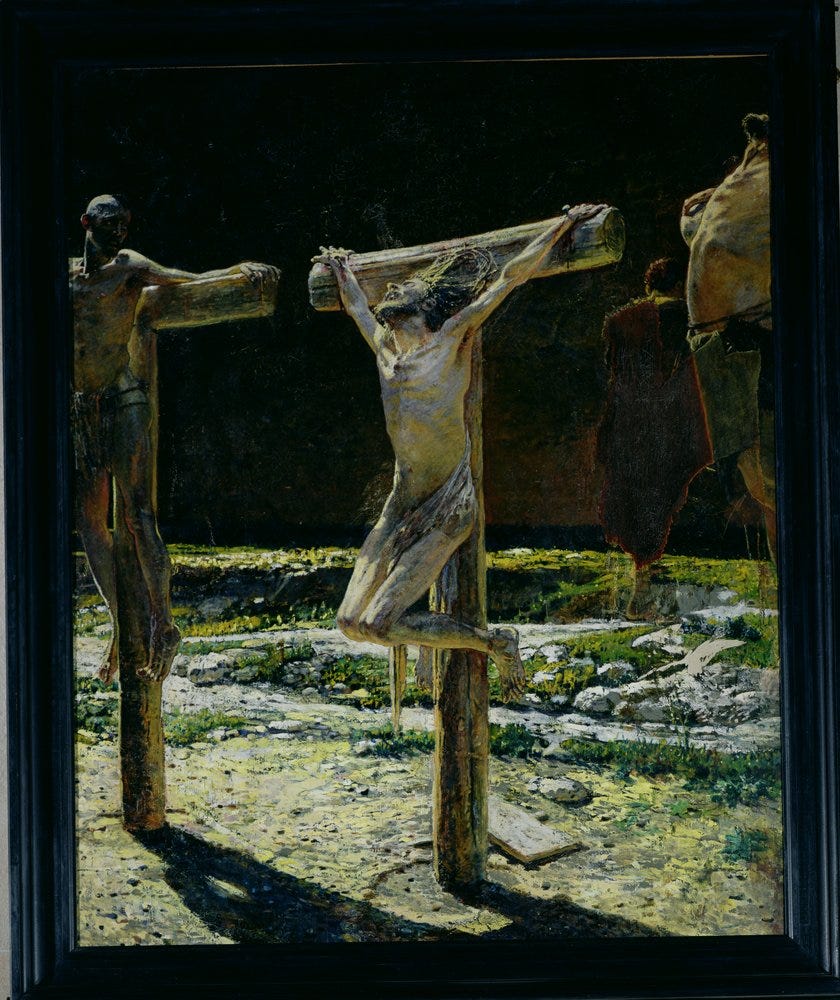The Gospel of Luke includes the story of what we know as the thief on the cross in telling the story of Jesus' crucifixion. Thief is actually a misnomer because the two criminals were more like insurrectionists who were involved in some sort of seditious activity against the Roman government.
Nevertheless, one of the criminals asks Jesus to remember him in his kingdom and Jesus assures the criminal that he will reside with Jesus in paradise. This little story within the story has been the subject of many sermons trying to persuade people to believe in Jesus and receive the promise of salvation.
Fair enough. Luke wants his readers to believe in Jesus and know that Jesus makes the promise of salvation possible. But some of these sermons became polemical. On the one hand, there was the polemic of using this story to say that receiving salvation is as easy as asking Jesus. Cue in the evangelistic question, “Have you trusted in Jesus to be your Savior and asked Jesus to come into your heart?” On the other hand, there was the polemic that I often heard growing up, which was in response to the other polemic. This polemic wanted to argue that this story was not a valid example of how people are saved since this occurred prior to Jesus’ actual death.
From where I am as a reader of Luke’s Gospel, both polemical sides miss the point of why Luke includes the story of this criminal being saved. When reading through the Gospel of Luke, it becomes clear that Luke wants the readers to know that Jesus of Nazareth is the Savior. He is the Son of God who fulfills the messianic promise of salvation for both Jews and Gentiles, as well as everyone who has been marginalized.
Just as Jesus revealed God’s promise of salvation in his life, he is now revealing the fulfillment of this promise in his death.
Nothing has changed in regard to the fulfillment of this messianic promise now that Jesus is crucified on a Roman cross between two criminals. The emphasis on salvation is shown by the fact that, according to Luke, the first words Jesus speaks from the cross are, “Father, forgive them, for they do not know what they are doing.”1
The crowd, the soldiers, and even one of the criminals all taunt Jesus as to why he saved others but can’t save himself. Of course, little do they know that Jesus would not have been able to save them had he saved himself. The truth is that Jesus could have easily saved himself. Jesus already had the power and authority of God, which he repeatedly exercised throughout his ministry as a blessing to others. But here, at the place called The Skull, where Jesus is crucified, he exercises his power and authority by choosing not to save himself so that he can save others—grace and mercy—as he pleads for the forgiveness of his enemies.
As Jesus hangs, one criminal has the eyes and ears to see and hear. This criminal knows that Jesus “…has done nothing wrong.”2 So he pleads for mercy, saying, “Jesus, remember me when you come into your kingdom.” Jesus responds by speaking the promise of salvation to this criminal: “Truly I tell you, today you will be with me in paradise.”
Do we have the eyes and ears to see and hear what the criminal sees and hears? By telling us about the promise Jesus makes to the criminal, Luke is assuring us that the crucifixion of Jesus is the promise that God’s salvation is possible. Just as Jesus revealed God’s promise of salvation in his life, he is now revealing the fulfillment of this promise in his death.3
On this Maundy Thursday, as we turn our attention toward the final steps that Jesus took to the Skull, where he was crucified, know that this is God’s promise of salvation. Jesus is crucified, dying for the forgiveness of sins so that we might receive the promise of salvation—not because we deserve it or have earned it but because we need it. If you’ve ever wondered whether the promise of salvation includes you, turn your eyes upon Jesus Christ crucified and know that the promise includes you.
Luke 23:34; all scripture quotations are from The Holy Bible, New International Version, NIV. Copyright © 1973, 1978, 1984, 2011 by Biblica, Inc. Used by permission. All rights reserved worldwide.
Luke 23:41.
Joel B. Green, The Gospel of Luke, The New International Commentary on the New Testament (Grand Rapids: Eerdmans, 1997), 823.



